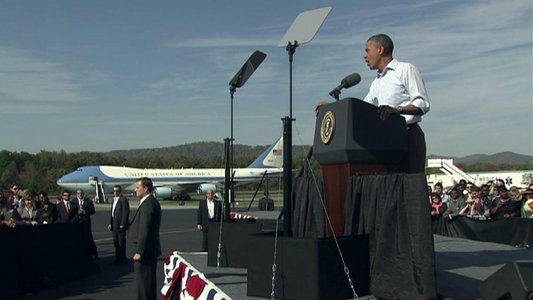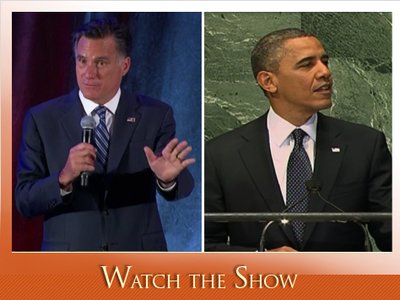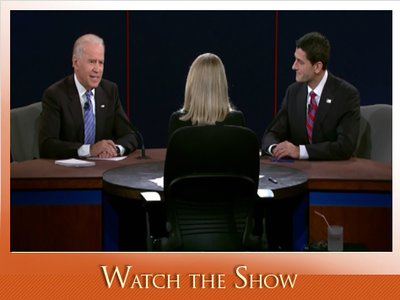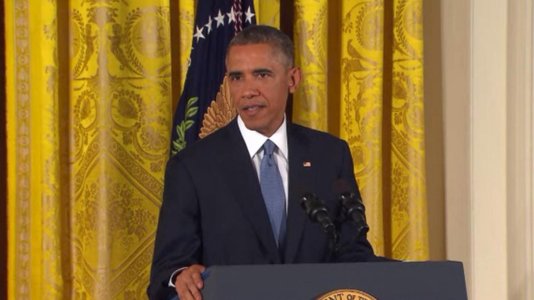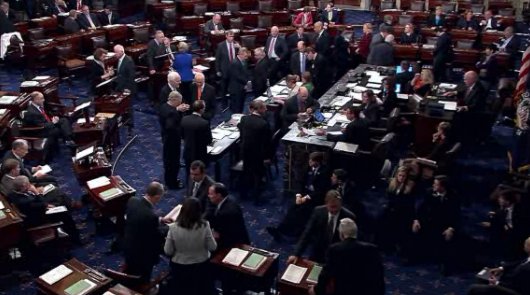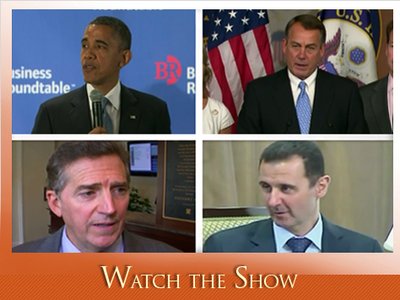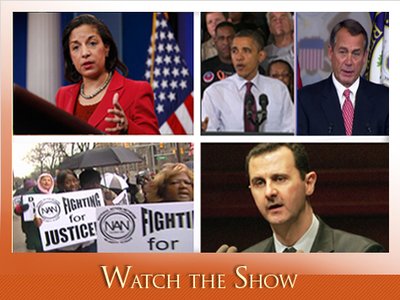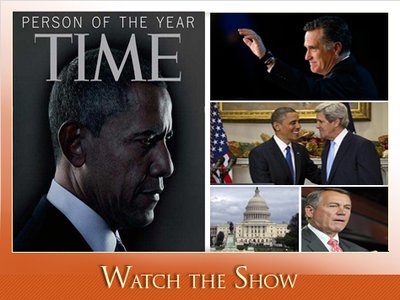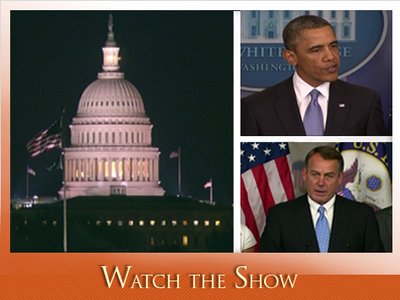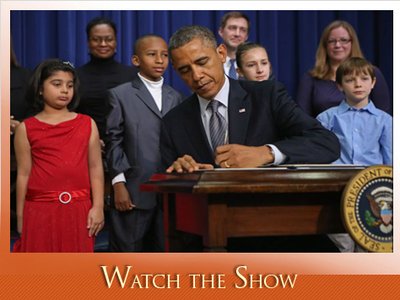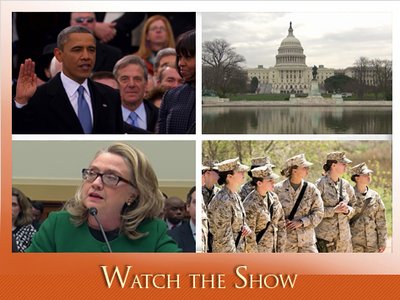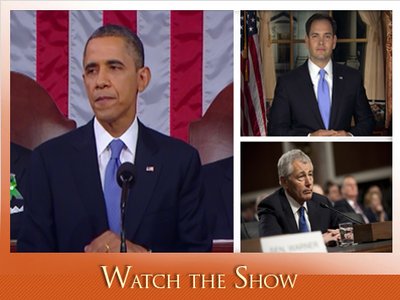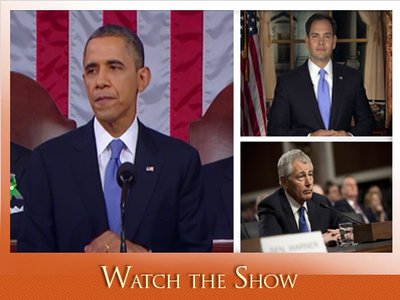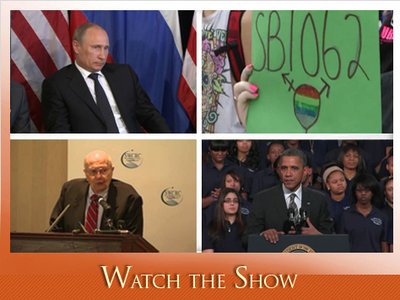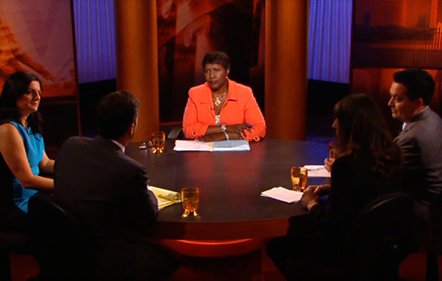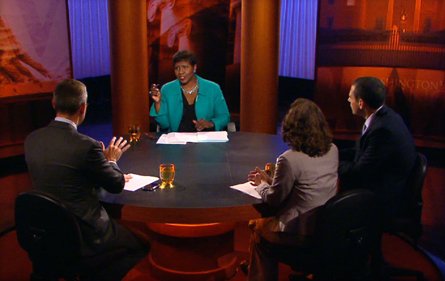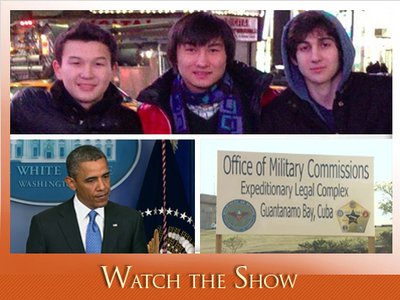In a week that stunned the nation, we look at the attack on the Boston Marathon and the suspect manhunt that has consumed the city of Boston. Also, we look at the politics behind the “shameful” defeat of gun control legislation. Plus, how do leaders respond to uncertain times. Joining Gwen: Tom Gjelten, NPR; Peter Baker, New York Times; Jeff Zeleny, ABC News; Karen Tumulty, Washington Post.
GWEN IFILL: A bombing, a manhunt, and a shocking lockdown on an American city, plus this week's setback for gun control, tonight on "Washington Week."
Boston under siege, several dead, more than 100 injured, and millions rattled by scary random terrorism.
PRESIDENT BARACK OBAMA: (From tape.) We may be momentarily knocked off our feet, but we'll pick ourselves up. We'll keep going. We will finish the race.
MS. IFILL: Uncertainty dominated the week.
SECRETARY OF STATE JOHN KERRY: (From tape.) I think it's fair to say that this entire week we've been in a pretty direct confrontation with evil.
SECRETARY OF HOMELAND SECURITY JANET NAPOLITANO: (From tape.) This is not an NCIS episode. Sometimes, you have to take time to properly, you know, put the chain together to identify the perpetrators.
MS. IFILL: Now there are suspects, but little clarity. We try to put the puzzle pieces together.
Also, another emotional moment in Washington --
MARK BARDEN: (From tape.) We'll return home now disappointed, but not defeated.
MS. IFILL: -- as victims watched, the Senate rejected a plan to impose background checks on gun buyers.
MR. : (From tape.) Mr. President.
MS. : (From tape.) Shame on you.
VICE PRESIDENT JOE BIDEN: (From tape.) There will be order in the Senate.
SENATOR TED CRUZ (R-TX): (From tape.) The proper approach, in my view, to addressing the issue of violent crime is to focus our resources, our attention on violent criminals -- to do everything we can to punish, to prosecute, and to deter violent criminals.
MS. IFILL: Covering a tumultuous week: Tom Gjelten of NPR, Peter Baker of the New York Times, Karen Tumulty of the Washington Post,\ and Jeff Zeleny of ABC News.
ANNOUNCER: Award-winning reporting and analysis, covering history as it happens, live from our nation's capital this is "Washington Week with Gwen Ifill."
(Station announcements.)
ANNOUNCER: Once again, live from Washington, moderator Gwen Ifill.
MS. IFILL: Good evening. We could not have invented this week if we tried. An iconic sporting event comes under attack. After one suspect is killed and another one runs, a manhunt consumes Boston, shutting down the city and its suburbs. The suspects have roots in the disputed Russian province of Chechnya, and in the middle of it all, the president of the United States becomes consoler-in-chief once again.
PRESIDENT OBAMA: (From tape.) If they sought to intimidate us, to terrorize us, to shake us from those values that Deval described, the values that make us who we are as Americans, well, it should be pretty clear by now that they picked the wrong city to do it. (Applause.)
MS. IFILL: The Boston Marathon bombings brought us back to that scary place we lived through after Oklahoma City, after Atlanta, and after 9/11 -- the sense that nothing is under control. So where do things stand tonight, Tom?
TOM GJELTEN: Still not quite under control, it seems, Gwen. And I imagine that for the people of Boston today must have been a day something like what 9/11 was for New Yorkers. A city shut down, a sense of paralysis, fear, vulnerability, police everywhere, armored vehicles. And tonight, as we go on the air, that situation is still the same. Police all over Boston. We don't know what's going on. Gunshots heard in the night, explosions heard. It's really something that we haven't seen in a long, long time. And this manhunt -- has there ever been a time in American history where we have seen a city shut down looking for one 19-year-old man?
MS. IFILL: Tell us, Peter, about these two suspects. One now deceased, the other, the brother, who is the one who everyone has been looking for.
PETER BAKER: Right. There're two brothers Dzhokhar Tsarnaev is the one who survived the shootout originally and has been sought all day in Boston. He's 19 years old, been here since 2002, just made a United States citizen last year, on September 11, as it turns out. Wrestling -- all-star wrestler in high school, studying at the University of Massachusetts Dartmouth, not doing well. His brother, who passed away, who died in a shootout last night with the police, Tamerlan Tsarnaev, 26. He's believed to be the more dominant of the two. There's discussion about whether he controlled or manipulated his younger brother. We've heard that scenario before. He was -- he'd said on some internet sites that he was very religious and talked about how he didn't have a single American friend.
MS. IFILL: But in the end, part of what was interesting about this story, aside from the sheer shock of it, was the breadth of the investigation. I heard 9,000 police officers at one point.
MR. GJELTEN: This was really an extraordinary police achievement. I mean, if you think about the thousands of people who were there around the Boston Marathon on Monday and they basically -- all they could do was to look for somebody that had a black backpack and, you know, acting in a suspicious manner, and they were able to identify two -- a man at each bombing site. That wasn't enough of them, but they did identify these two suspicious characters. The real turn came when they found out that those two individuals were walking together at one point. So you just saw two men walking together, and then coincidentally, each of them ended up at one of the bombing sites. That was the key and that's how they figured it out. But it took extraordinary work.
MS. IFILL: One of the other interesting things that came out of this -- I mean, that seemed like there was one more -- one revelation after the other -- and Peter, you would know something about this because you've actually been there -- but they have Chechnyan heritage, these two, and all week long, we were saying this is domestic terrorism.
Was this foreign terrorism?
MR. BAKER: And we still don't really know --
MS. IFILL: We still don't know.
MR. BAKER: -- right, I mean, we've got to be very careful here. Yes, they are Chechen by ethnicity, but they have never really lived in Chechnya as grown men. They actually grew up in Central Asia, a place called Kyrgyzstan, moved here in the very early 2000s. So what's their connection to the longstanding conflict in Chechnya is is a still kind of a mystery. One of the brothers did talk on the web at one point about how Chechnya ought to be independent from Russia. This is a century's old dispute between Moscow and this Muslim republic in the southern tier. But that doesn't necessarily mean that they're at all connected to the conflict. There're no evidence at this point we've seen publicly of any ties to any well-known group. So we're speculating to some extent and it could be something completely unrelated for now.
KAREN TUMULTY: I was struck, during the reports today, as best their friends could tell, they were both thoroughly American, especially the younger brother. Friends were recalling his sports achievements. He was in the drama club, that he went to the prom. These were not sort of isolated people who sort of held themselves outside of society.
MR. BAKER: And Chechens haven't had a real beef with America. They're not thrilled with us in the way a lot of -- a lot of some of the more Islamic jihadist type organizations are --
MS. IFILL: Their beef is with Russia.
MR. BAKER: But their beef is with Russia, exactly. It is a separatist conflict that morphed, that got hijacked to some extent by Islamic jihadists, but there has not been an anti-American type of a movement up until now.
MR. GJELTEN: But you know, we did learn that the older brother, in recent years, had become and take -- come to take Islam much more seriously. He actually married a Christian woman, but then she converted. And according to our reporting today, she was put under a lot of pressure by him to become more and more devout to the point that she actually, at this point, has been wearing a hijab. So some kind of change took place, at least in the mind of this older brother. He became, I think, less and less integrated into American life for whatever reason.
JEFF ZELENY: I think you're right, Tom. That's what my reporting was in the hitting on the Hill. I was up talking with intelligence members in the Senate and in the House. And one thing that the House Homeland Security Committee chairman as he went to zero in on is a trip that the older brother took to Russia last year, for six months, he spent in Russia. And he's asking the question, was he radicalized there?
How easy is that to answer, though?
MR. BAKER: But that's an issue. He took a trip to Russia for six months, but his parents, about a year ago, moved back to Russia, a region called Dagestan, next to Chechnya. So he has every reason to go and visit his parents. New York Times reporters in Moscow talked with his father today. He was never out of my sight. We went and visited relatives in Chechnya, but he never had any opportunity to go train or involve --
MR. ZELENY: But the father also said he was being framed in the United States.
MR. BAKER: He said he was being framed. Uncles, by the way, who are estranged from this segment of the family, seemed to accept the idea that this might have happened and that these are losers, as one of them put it.
MR. GJELTEN: Well, that's interesting that he did say -- he said he had brought shame on the Chechen identity, the Chechen nation. And he ridiculed the idea that these guys were motivated by ideology or politics. You're right, Peter. He just said they're losers and they didn't fit in. And the truth is that when you look at the violent crimes that we've had, the mass shootings in recent years, there sometimes are indications of maladjustment and so forth. So I just want to underscore --
MS. IFILL: Except this was an uncle who hadn't seen them since 2005, so I -- it feels at moments like this that a lot of people come out of the woodwork. The only thing that's different is usually they come out of the woodwork and say he was a loner.
MR. GJELTEN: Right.
MS. IFILL: And he was kept to himself. And we're hearing wildly divergent descriptions instead.
MR. BAKER: Right. And it doesn't have the kind of organization that you've seen in the Chechen terrorist cells in the past. The Chechen terrorists have been very effective in Russia in the past. I was there in Moscow when they'd seized a theater full of people, 130 people died. I was there in Beslan, this small town in Southern Russia, when they seized a school, 300 people died, including -- most of them, children, in fact. So they have been incredibly effective at mass slaughter, very well organized operations before. This doesn't look like that kind of an operation.
MS. IFILL: Well, let's get back to what this one looks like. Does it bear any resemblance in any way to other terrorist attacks that we have seen either foiled or carried out?
MR. GJELTEN: Well, we do know that there has been a variety of sort of domestic extremist attacks on symbols of government, the federal building, the, you know, government buildings in New York and so forth. That's from sort of the domestic extremist point of view. And then, the jihadi groups have tended to focus more on sort of symbols of the American nation. There was a lot of interest in attacking monuments. The Boston Marathon --
MS. IFILL: In Times Square, there was --
MR. GJELTEN: The Times Square. The Boston Marathon sort of doesn't fit either one of these categories. I mean, it's an iconic event. It's an iconic institution for the people of Boston, but internationally, it doesn't really have that kind of image. So it's just a hard one to figure out.
MS. IFILL: On the other hand, it is also a big spectator event. We haven't seen that sort of thing, where you see a lot -- with a lot of cameras already pointed at it. We knew it was going to be a big --
MR. BAKER: Look what's happened here. It's -- and no way to minimize it, but three people died. That's one tenth, 1 percent of the people who died on 9/11, and yet, we as a country are gripped by it. We are terrorized. It has literally achieved that end, that goal of terrorism. And what's remarkable to me is actually we've gone 10, 12 years now since 9/11 without a series of these type of small-scale attacks that would have just as much impact, I think, on this country as the larger scale ones.
MR. GJELTEN: You know, that was a very intimate attack. There was this poignant story of a young man who lost both legs in the bombing and he says that in the moment that the bomb went off, the bomber was right there in front of them and looked them in -- or the moment before he put his bag down, the bomber was right there and looked them in the eyes. So he knows who set off the bomb. And it's just a very sort of personal thing.
MS. IFILL: We should say that our friend Pete Williams at NBC News, who sits around this table some nights, has been reporting tonight that there has been -- that the second suspect, the younger brother, has been, they think, may be perhaps cornered. They think maybe he's in a small -- in a neighborhood in Watertown, and we're still waiting for confirmation about whether he's dead or alive.
But that raises the question to me about the breadth of this investigation. How much of it was federal? How much of it was local? How much of it was state? Who took the lead?
MR. GJELTEN: Well, this was one of these classic cases of a joint terrorism task force. This is an institution that has really developed in the aftermath of 9/11, where you bring together all kinds of law enforcement agencies, all kinds of jurisdictions -- local, county, federal, state -- they work together as a task force.
And this seems to have been worked very well in this case.
MS. IFILL: OK. Well, in that case, we're going to move on. And if we get anything new while we're still on the air, we'll share it with you.
Even beyond Boston, the president's week was a complicated one, especially after the Senate decisively rejected the mildest form of gun control to emerge after the Newtown shootings, background checks for gun buyers. Only a week ago, a Republican senator, Pat Toomey, and a Democrat, Joe Manchin, seemed to have hit on the perfect bipartisan compromise, but no. The president called the Senate defeat shameful. But Republicans and several Democrats, too, called it necessary. What happened in the end, Jeff?
MR. ZELENY: What happened in the end is probably what was going to happen in the beginning. That gun control is one of the most complicated things to pass the Senate. Yes, there was incredible emotion. I was up there for the last couple of weeks, as these Newtown families were going door to door to door, talking to senators. And it was the most emotional lobbying campaign that I've ever seen, but what was not present, at least visible, was this aggressive lobbying from the NRA and from Gun Owners of America, who simply would not allow Republicans, most Republicans to join this effort.
So I think what happened this week was -- I mean, first of all, the final bill that was being discussed, the expanding the background checks, was just a very small watered down measure, compared to what the president had proposed on, you know, a ban on assault weapons and other things like that. But even that couldn't have passed. Four Democrats ended up voting against it, but the big problem was they couldn't get Republicans to sort of sign on to that, even moderate Republicans.
John McCain, I thought, when he was giving his floor speech -- he voted for this -- boy, it reminded me of the John McCain of 2000. He was out there saying this is the right thing to do. Gabby Giffords was shot. She's my friend. And there were still not enough Republicans to do it. You asked them privately, they said it's not an easy vote to take and they said the House isn't going to pass this anyway, so why should I vote for this?
MS. IFILL: But it wasn't just Republicans saying this. It was some key Democrats who wouldn't get --
MR. ZELENY: There was four Democrats who voted no, but even if all four had voted for it, they still would not have had the 60 votes. But it was a couple of different things with it. The House probably not doing it was -- at least one explainer why some Senate Republicans thought it was easier to vote against it.
MR. BAKER: What does it say about the president's possible domestic legislative agenda for the rest of his term? He's got three and a half years left. This is an issue that -- the background checks, not the other parts of the package -- had 90 percent support. If he can't get this through, what can he get through in his next three and a half years?
MR. ZELENY: It's a great question and we'll see coming up on immigration. Immigration is sort of -- is next up. The bill was introduced this week as well, as everything else was going on. It was almost an afterthought. But people think immigration has a better chance of passing because it's politically more expedient and more popular for Republicans. But it -- it is not to be underestimated the size of defeat this is for this White House. He put his Capitol on the line. The vice president was up there for the vote. He was making phone calls. The president flew Newtown families in and things. It is a significant defeat for him. And I think it means that most of the rest of his second term, he does not have a bigger legislative agenda remaining.
MR. GJELTEN: And he seemed really angry by the defeat. I'm curious whether that's like tactical at all or was it just plain emotional, visceral anger.
MR. ZELENY: I think both, but I think it certainly seemed visceral. I cannot remember a time, at least in a public policy setting, sort of politics aside, where he was that angry, standing in the Rose Garden with the families around. And that was real. That was anger. He believes that.
MS. IFILL: Vice President Biden with his hand over his face and looking like he was --
MR. ZELENY: That was an incredible picture on the front page of the New York Times. And he -- I think he was mad about this. But the question is we'll see if the power of this organization that he built, Organizing for America, it's this sort of a post-campaign group. Are they really going to go after some of these Democrats who voted against it and primary them? Of course, they're not. So I think it was always going to be tough.
MS. TUMULTY: Well, that was what was striking too because all the way through the campaign, the president had said, you know, I finally began to realize you cannot change Washington from the inside. You have to change Washington from the outside. And we saw him on this gun control issue do all of the things he said he was going to do. He went around the country to build support. That the last weekend before he had one of the victims of the shootings parents give the Saturday radio address. And it suggested that you can't even change Washington from the outside. So essentially, you wonder, you know, what tools, what levers does he really have left?
MR. ZELENY: I mean, part of it was the White House and his supporters kind of got beat in the message game here. The NRA and Gun Owners of America effectively branded this as a gun registry, which is something that a lot of Republicans can't support, and in fact, that wasn't true.
MS. IFILL: Did they do that -- kind of sub-rosa, because we were so busy paying --
MR. ZELENY: Absolutely.
MS. IFILL: -- attention to the lobbying campaign, the very emotional lobbying campaign that this was happening quietly?
MS. TUMULTY: You get the sense that these were, you know, two entirely different kinds of operations. One was all about message and the other was all about sort of the mechanics. I mean, the gun rights people, they -- they had their machinery going, and it really did look like they were losing the message war, but it turned out the message war didn't matter.
MR. ZELENY: And they branded this as something that would essentially be a federal gun registry, which wasn't true. In fact, there was a portion of the bill, a piece of legislation in the bill that would make it felony if there was actually a gun registry. I mean, heaven forbid, having electronic gun registry. But that is very controversial in some places. But I would say this is one that the White House and Senator Harry Reid, the majority leader, was a bit outmaneuvered by the other side on this.
MS. IFILL: Is this possible that this face-to-face victim lobbying, Gabby Giffords running a very emotional op-ed piece the next day in the "New York Times," and everybody declaring this is only round one and they'll be back, that that can change what we just saw, that we could -- that can actually change the formula?
MR. ZELENY: We'll see. I mean, we'll see if different senators are elected. But there were a few other profiles encourage, I would say. Senator Mary Landrieu, she's up for reelection. She's from Louisiana. She voted for it. I ran into her in the hallway after the vote. And I said, Senator, how tough a vote was that? She said it was a very tough vote, but it was the right thing to do. So there were some instances of that, but Senator Reid has effectively pulled the bill. He said it's time to take a pause here and a breath here and kind of see what the next steps are. But I think it's done for gun control legislation, at least with this current make up of the Senate.
MS. IFILL: It may be too much to ask of people who were taking tough votes to take tough votes on immigration and gay marriage and gun control --
MR. ZELENY: Right.
MS. IFILL: -- in one session.
Thank you, Jeff, and congratulations on the new job.
MR. ZELENY: Thanks, Gwen.
MS. IFILL: So how does government, how do leaders, how do we function when everything is so uncertain? The White House released this picture of the president meeting with security advisors on the Boston bombings in the Situation Room today. At a time like this, though, with ricin scares and shocking explosions in Texas and municipal shutdowns and legislative setbacks like gun control, it's hard to know if that picture is reassuring or concerning.
Karen, which?
MS. TUMULTY: Well, I tell you. What struck me as I saw that picture was, oh, my gosh, they're just like the rest of us. They're just sitting there waiting to get an update on the latest horrible thing that just sort of washed over us this week. And it's so striking when you think about where they were just a week ago. It looked like this bipartisan compromise could be clearing the way for at least modest gun control legislation. Immigration was on the verge of a compromise. Today, it already seemed as though the immigration issue was about to be dragged into what was happening in Boston.
As we heard a senior Republican on the Judiciary Committee, Chuck Grassley, say, we don't know the immigration status of the people who have terrorized the communities in Massachusetts. When we find out, it will help shed light on the weaknesses of our systems. This is -- this is -- you know, has the potential to completely reframe the immigration debate going forward.
MS. IFILL: And it seems it puts the president in a precarious position politically, which is to say it's all uncertain. And if you're in the first half of your second term, what you want is a little bit of certainty because you're never going to be in a stronger position.
MS. TUMULTY: Well, I think when people feel that things are so out of control, they are not going to be as likely to make the kind of big bet that you need to make on a sort of major policy change, as for instance immigration overhaul would be.
MR. BAKER: Yeah, I think the problem also is that these various things that you talked about, the ricin and the other incidents, all of which are probably unrelated, many of which probably we wouldn't have been necessarily paying much attention to, had it not been for Boston. They come together and they -- rather than rallying people behind the president, as these instances have in the past, have entered questions into his leadership and where the country is.
MS. TUMULTY: You know, though, interestingly enough, some of the proponents, including some of the Republican proponents of overhauling the immigration laws were saying to me today, you know, that if this does become an argument about national security, that they do thing that they've got some good arguments to make, that really, you know, the bill as it was introduced by this so-called Gang of Eight, it requires that the border security be beefed up before anything else can happen. And they do believe that, you know, that it is possible to sell immigration reform as a national security move. We'll see.
MR. BAKER: It's important. I might remind people that these two individuals, who are the subject of this manhunt in Boston, were here legally. They were not here illegally. And they in fact, came on refugee status.
MS. TUMULTY: Right.
MR. ZELENY: But that kind of rhetoric from Senator Grassley, though, does that have the potential to sort of spread like wildfire or have the Gang of Eight, the Republicans in the Gang of Eight, sufficiently insulated themselves --
MS. IFILL: Are they -- is the Gang of Eight stronger than the Gang of Two was on --
MS. TUMULTY: Well, except that the number of attacks that were coming at Senator Marco Rubio from the Right were pretty extraordinary, including Ann Coulter sent out a tweet this morning, when we found out that one of the suspects was dead, saying, well, there is one person who won't be getting amnesty under Rubio's bill. And so it's really interesting to --
MS. IFILL: Factually inaccurate --
MS. TUMULTY: I know, but this is --
MR. ZELENY: Never mind that, yeah.
MS. TUMULTY: But this is a man who was a hero to the Tea Party, who was essentially, you know, helped create the Tea Party, and all of a sudden, on this issue, he is facing an onslaught, right.
MR. GJELTEN: But in the end he did decide -- he has decided, it seems, to stand up for his -- seems to have decided to actually back immigration reform.
MS. TUMULTY: Yes. And aggressively, I mean, they are fighting every single one of these charges. As one of Rubio's aides said to me today, for as far as they're concerned no blog is too small to answer.
MS. IFILL: So is the president strategy now no more of this bipartisanship dinner stuff, let's just stick to whatever I can get down with Democrats, or is there another way?
MS. TUMULTY: I do not -- I cannot imagine at the White House right now, they know what their strategy is going forward, because they've done the outside game. They've done the inside game. Nothing's working right now.
MS. IFILL: It's like that picture of them sitting around, waiting to see what happens next.
MS. TUMULTY: Exactly.
MS. IFILL: OK. And we're also waiting to see what happens next with that story in Boston tonight. We'll keep you up-to-date on it, but it's going to have to be online. Thank you everyone. Story's bound to keep moving all weekend. You can join us at 8:30 p.m. Eastern for the "Washington Week" Webcast Extra. It'll be streamed live. And among other things, we'll be talking about that ricin scare and about Mark Sanford, yes, that happened this week, too.
Keep up with daily developments online at NewsHour.pbs.org and on air all next week. On our website, given the events of the week, you can find my commentary on what happens when journalists try to get it first before getting it right. That's at pbs.org/Washingtonweek. And we'll see you again next week, on "Washington Week." Have a good night.

